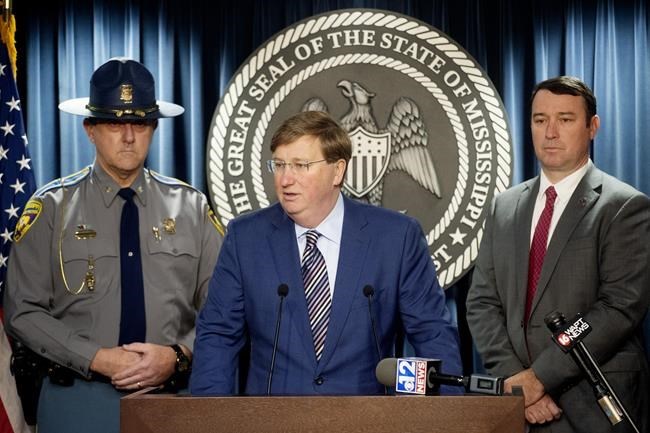
Mississippi Gov. Tate Reeves, center, expresses his gratitude for law enforcement during COVID-19, at a news conference at the Walter Sillers Building in Jackson, Miss., on Monday, Dec. 20, 2021. (Eric Shelton/The Clarion-Ledger via AP)
December 26, 2021 - 2:01 PM
JACKSON, Miss. (AP) — Mississippi Gov. Tate Reeves says he would support efforts to revive the initiative process, months after the state Supreme Court ruled that the process was outdated and invalid.
The issue could come up during the legislative session that begins in January.
“I think that access to the ballot is important,” Republican Reeves said in response to questions at a news conference last week.
“I don’t think that one person writing a 2 or 3 million dollar check on any one issue to put it in our state constitution is the correct way to do it,” he said. “But I do think the citizens should have access to the ballot, and it ought to be done in a way where it’s challenging to get on the ballot but that it is possible.”
Since the 1990s, Mississippi had used an initiative process that allowed people to propose constitutional amendments. If they gathered enough signatures from each congressional district, the initiative could go on the ballot.
The court invalidated the initiative process in May, when it handed down a ruling that also tossed out a medical marijuana initiative approved by voters six months earlier.
Madison Mayor Mary Hawkins Butler challenged the medical marijuana measure shortly before the November 2020 election, arguing it was not properly on the ballot because signatures were gathered from Mississippi's five old congressional districts instead of the four current ones.
After a hearing detailed legal arguments, six of the nine justices agreed. Their ruling halted the state Health Department's work in developing a medical marijuana program. It also left Mississippi without an initiative process.
Some proposed initiatives were left in limbo by the Supreme Court decision.
People had been gathering signatures for months on one initiative that would put several proposed state flag designs on the ballot. The effort was promoted by those unhappy that legislators in 2020 retired the last state flag in the U.S. that included the Confederate battle emblem.
Days before the Supreme Court ruling, health care professionals announced they were starting to gather signatures on an initiative to expand Medicaid. They were trying to bypass the Republican-led Legislature, which has steadfastly rejected expanding the government health insurance program to people who work in low-wage jobs without private insurance. Medicaid expansion is an option under the health overhaul signed into law in 2010 by then-President Barack Obama; Mississippi is among the dozen states rejecting it.
Medical marijuana remains an unresolved issue.
A small group of legislators spent months negotiating a proposal that was similar to the initiative approved by voters. House and Senate leaders urged Reeves to call a special legislative session during the fall so the proposal could be put into law, but Reeves never did.
At the news conference last week, the governor said he would veto the current proposal because it could allow hundreds of thousands of people to have access to large quantities of marijuana — enough, he said, to make 1.2 billion joints per year in the state of about 3 million residents.
“If there are 1.2 billion joints floating around Mississippi in any one year, I believe that is no longer medicinal, it is no longer for the purpose of helping those who badly need it, and it becomes recreational,” Reeves said.
He said the widespread availability of marijuana could hurt economic development by discouraging people from working. Mississippi already has a low rate of workforce participation among working-age residents.
Reeves said he wants a medical marijuana program to include tighter control by physicians and a role for pharmacists. Legislators who have negotiated the proposal say they've done so in good faith, seeking to provide compassionate relief for people with debilitating illnesses such as epilepsy, multiple sclerosis or cancer.
____
Emily Wagster Pettus has covered Mississippi government and politics since 1994. Follow her on Twitter: http://twitter.com/EWagsterPettus.
News from © The Associated Press, 2021